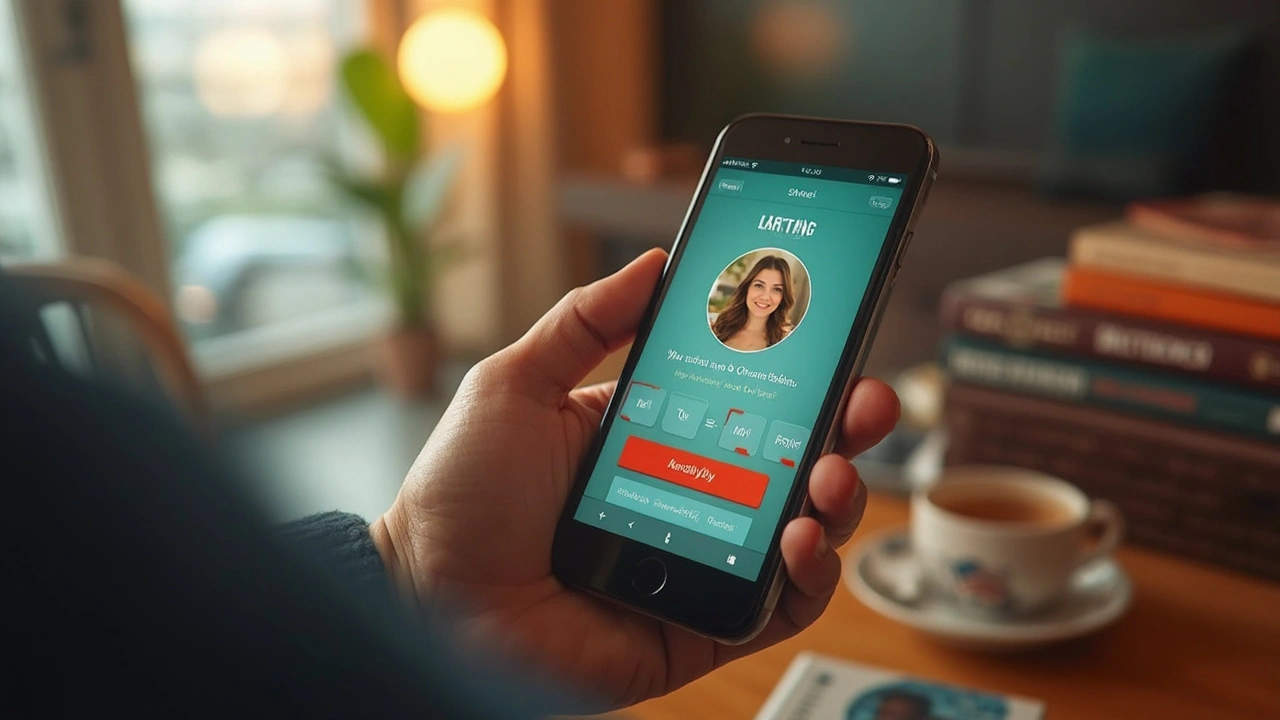Not long ago, the idea of meeting your soulmate online sounded like a punchline. Fast-forward to now: around three in ten Americans have tried online dating, and nearly 15% of adults in the US say they’ve met a partner through a dating app. If that stat makes you feel like you're late to the party, don't sweat it. Dating online is awkward and overwhelming—no manual comes with your first swipe. But really, you don’t need a manual. You just need to get inside the heads of people who’ve done this before. Ready to figure out what actually works?
Understanding the Online Dating Landscape
Dating apps are everywhere. Tinder, Bumble, Hinge, OKCupid, Match, Coffee Meets Bagel—the list scrolls on and on. A decade ago, you’d have two or three digital places to meet singles in your area. Now, the choices stretch as wide as your patience. Tinder exploded worldwide in 2012, and within three years claimed over one billion swipes a day. As of today, Bumble claims more than 100 million users and Hinge doubled its user count between 2021 and 2023. Each app pushes a slightly different vibe. Tinder is fast and flirty—great if you like making decisions in seconds. Hinge wants you to fill out detailed prompts, almost like you’re answering questions on a dating game show. Bumble puts women in control, meaning only they can start the conversation (if that feels intimidating, it’s meant to be empowering, not scary).
But here’s a reality check—most people don’t find love right away, and most swipe sessions don’t end with fireworks. According to Pew Research in late 2023, only 12% of online daters reported a long-term relationship or marriage from an app. That doesn’t mean you’re doomed. It just means you need to manage expectations and understand the culture. Each app has its own slang: "ghosting" means someone stops replying, "catfish" means someone faked their identity or looks, and "breadcrumbing" is when someone leads you on with occasional messages but never commits. DIY platforms like Reddit’s r/dating_advice and TikTok are overloaded with tips, but you should focus on your own comfort and safety. Some apps require you to verify your ID or upload a selfie to prove you're real—take advantage of that. It weeds out fakes faster than you think.
Your age changes your choices. The average Tinder user is 26, while Match.com’s crowd skews 40 and above. Niche apps for religion, hobbies, or even pet lovers attract smaller but more targeted crowds. According to the biggest study by Stanford in 2019, around 39% of couples who married in the last decade met online. It’s not just for hookups—unless you want it to be. Check user reviews, app policies, and how the platform handles your data before signing up. They won’t tell you where your photos might end up, so pick a service that gives you some privacy control. Try a few and see which style matches you best.
Building a Catchy, Honest Profile
Here’s something nobody tells you: people decide if they’ll swipe on you in under two seconds. That’s faster than flipping through TV channels. Your online dating profile needs to stop people mid-scroll—but also show who you really are. Start with your pictures. First, skip the bathroom selfies. Photos with natural light, clear faces, and actual smiles get two to three times more likes. According to a study by Hinge, profiles with at least three different photos (one close-up, one full-body, and one doing what you love) do best. Bonus points for photos with pets or travel—those spark more responses.
Your bio isn’t a resume. Keep it short but real. “Food lover, terrible at karaoke, can’t start my day without coffee” works better than corporate talk or endless quotes. Be specific: mention a favorite show, a weekend hobby, or a fun fact. Avoid negatives. Instead of “Don’t message me if you’re just here for hookups,” try “Looking for someone who enjoys deep talks and bad puns.” Sound curious about life, not jaded by dating.
What you write attracts what you get. If you mention you’re looking for a long-term relationship but all your photos are bar selfies, expect mixed signals. Be upfront about what you want. Don’t lie about your age, height, or intentions. Sooner or later, someone will meet you, and the truth always comes up. Got kids? Share that when you feel ready, but don’t hide important facts. If you’re unsure what to write, check out profiles you admire. Notice what grabs your attention, and mimic the style—not the details.
- Tip: Mind your spelling and grammar. Typos make a difference. A UK survey found that 69% of people swipe left on profiles full of errors.
- Tip: Ask a buddy to look over your profile—they'll spot when you’re trying too hard.
Your photos and bio set the vibe. Don’t overthink it, but don’t rush. Update them if you’ve had big changes (like that epic haircut or new job). The more current the better. Old photos only make for awkward first dates and letdowns.

Mastering the Art of Messaging
So you matched! Now what? Messaging is where most newbies crash and burn. One bad opener—“Hey ;)” or “Hi, beautiful!” —and you’re stuck in the ignored pile. Start with something personal to their profile: “Your dog is adorable. What’s his name?” or “I saw you love hiking. Got a favorite trail?” Make it about them, not just a generic greeting.
If you’re tongue-tied, look for prompts. Apps like Hinge give you icebreakers like “Let’s make sure our first date is at…” Others, you’ll need to improvise. Referencing a shared interest jumps you to the front of the line. People like to talk about things they’re proud of, so notice what they’re showing off—whether it’s a guitar, a travel backdrop, or a hilarious T-shirt.
Keep messages short and light to start. Ask a question they can really answer, not just “How are you?” If replies go dead, don’t double-text right away. Ghosting is common—it's rarely personal. If you don’t hear back after a couple tries, just move on. Keep talking to multiple people until a conversation clicks. Never send anything you wouldn’t show your mom. Screenshots go viral way too fast.
How fast should you move to a date? If you’re both into the convo and it’s been a few days of steady chat, float the idea: “I’m having fun talking. Want to grab coffee this weekend?” Video calls are good buffers now too. Most apps added built-in video chat during the pandemic, and it makes meeting in person feel less risky.
- Tip: Don’t ask for someone’s number or socials in your first message. Build a little trust first.
- Tip: If you feel a vibe, suggest a specific time and place to meet. Avoid back-and-forth limbo.
Here’s a quick stat break for conversations that go somewhere:
| Opening Line Type | Reply Rate |
|---|---|
| Personalized Question | 45% |
| Simple Greeting | 27% |
| Random Pickup Line | 18% |
That’s why effort matters from the jump. People want to feel seen, not scanned.
Spotting Red Flags and Staying Safe
Most online daters are regular people looking for connection. Still, every app has its creeps and scammers. Catfishing, fake profiles, and romance scams are up: the FTC reported $1.3 billion lost to romance scammers in the US in 2023. Always reverse image search profile pics if something seems fishy: right-click the photo, search Google Images, and see if it pops up elsewhere. Profiles with only one filtered selfie or no social links demand a closer look.
If someone professes their love fast or avoids video calls, that’s usually a script. Watch for awkward English, strange stories (like being “stuck overseas on business”), and requests for money, gift cards, or even flights home. If it feels weird, it almost always is. Trust that gut twinge.
Set first meetings in public, busy places—think coffee shops and parks, not quiet bars or someone’s house. Let a friend know where you’re going and share your location on your phone just in case. Some apps even have “panic button” features or emergency hotlines built in; use them if you need to. Never share your address until you fully trust someone.
Other safety pointers:
- Drive yourself (or use rideshares) on first dates. Skip rides from strangers.
- Avoid sharing personal details—like where you work—before you’ve met.
- If you feel uncomfortable, make an excuse and leave. Trust yourself.
- Stay sober, or at least in control, especially the first few times.
- If someone pressures you or gets angry at boundaries, block and report them.
Real love and friendship can come from digital spaces. But handling creeps and scams is part of the landscape. Respect yourself, set boundaries, and remember: no one is owed your time or trust without earning it.

Managing Expectations and Finding Real Connections
After a few weeks on the apps, expect to feel a mix of excitement, frustration, and possibly self-doubt. Don’t worry—every first-timer goes through “swipe fatigue.” The highlights might be great—someone cute responding, maybe a thrilling first date. But brace for dry spells, awkward conversations, or people flaking at the last minute. Out of 20 matches, you might chat with 10, and meet up with only 1 or 2. That’s not a bad average; the numbers are just part of the game.
If chemistry isn’t there, don’t ghost people. A short, polite message works: “Hey, I enjoyed talking, but I don’t think we’re a match. Good luck out there.” It saves both of you time and awkwardness. Message people you genuinely want to meet, not just anyone who swipes right. Your experience depends more on your mindset than your profile.
Filters help but don’t get carried away. Just because someone isn’t into your favorite band doesn’t mean they aren’t worth a shot. Be open, curious, and aware that attraction sometimes grows over time. If you’re only chasing the “perfect match,” you’ll miss out on unexpected sparks.
Share your journey with friends. A little outside feedback can keep you sane. They’ll see patterns in your swipes or texts that you might miss. Plus, you’ll have someone to laugh with about all those wild dating stories.
Dating apps can boost your social confidence. Studies say people who date online often build better communication skills. The more you practice, the smoother your talks get—in life, not just on-screen. If you find yourself dreading every log-in, it’s time for a break. Don’t let swiping take over your day.
Real connections can and do happen. Today, about 40% of couples under 35 met through an app. Start relaxed, don’t second-guess yourself, and remember it's okay to walk away from bad experiences. Keep showing up and, sooner or later, your first big online romance story might just become the next success statistic.


Written by Eldridge Fairweather
View all posts by: Eldridge Fairweather